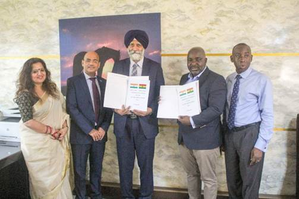Businesses
India, Ghana agree to operationalise UPI link within 6 months
New Delhi, May 6 (IANS) India and Ghana have agreed to operationalise Unified Payment Interface (UPI) with Ghana Interbank Payment and Settlement Systems within six months in order to enable instant fund transfers for users in both countries, the Commerce Ministry said on Monday,
The discussions were part of a Joint Trade Committee (JTC) meeting between Indian and Ghanaian officials in Accra from May 2-3.
Both countries also discussed the possibilities of a Memorandum of Understanding (MoU) on Local Currency Settlement System (LCCS) in trade, digital transformation solutions, and on the opportunities offered by the African Continental Free Trade Agreement, the Commerce Ministry said.
The linking of Indian and Ghanaian instant payment systems will be the latest in India’s expansion of UPI operations, which are already available in countries such as France, UAE, Sri Lanka and Mauritius.
The move to settle bilateral trade payments between the two countries in local currencies will reduce dependence on the US dollar and help to strengthen the rupee.
A seven-member delegation from India led by Additional Secretary, Department of Commerce, Ministry of Commerce and Industry, India, Amardeep Singh Bhatia.
In a comprehensive dialogue, both sides undertook a detailed review of recent developments in bilateral trade and investment ties and acknowledged the vast untapped potential for further expansion.
Both sides identified several areas of focus for enhancing both bilateral trade as well as mutually beneficial investments. These include cooperation in pharmaceuticals, healthcare, information and communication technology, agriculture and food processing, renewable energy, power sector, digital economy and digital infrastructure, critical minerals, textiles and garments, etc.
An official delegation from India consisted of officials from the Geological Survey of India, EXIM Bank and the Indian Pharmacopoeia Commission. The officials of both India and Ghana actively engaged in the proceedings of the JTC.
A business delegation led by the Confederation of Indian Industry (CII) also accompanied the official delegation with representatives from the varied sectors including power, fintech, Telecommunications, electrical machinery, and pharmaceuticals sectors.
The delegation including representatives of business also met the Secretary-General, AfCFTA and his team of officials wherein areas of cooperation included the signing of an MoU, setting of standards, investments, participation in trade events in India, and increasing the depth of engagement between India and AfCFTA was discussed. Names of nodal officers to take the discussions forward were also exchanged.
Ghana is an important trading partner of India in the African region. Bilateral trade between India and Ghana stood at USD 2.87 billion in 2022-23. India stands as a leading investor in Ghana and emerged as the third-largest investor. These investments traverse diverse sectors, encompassing pharmaceuticals, construction, manufacturing, trade services, agriculture and tourism.
–IANS
sps/dan
Businesses
SECI plans 500 MW solar thermal capacity tender in 2024-25 in big push to green energy


New Delhi, July 3 (IANS) The Solar Energy Corporation of India (SECI) is likely to float a tender for 500 megawatt (MW) of solar thermal capacity by the end of 2024-25, company chairman R.P. Gupta said on Wednesday.
“This will be the first time in India that such a tender would be floated on this scale. The projects under the 500 MW tender will have advanced technology where steam would be generated through heat and it would also help in running turbines,” the SECI chief said while addressing the India Energy Storage Week event here.
“We require energy round the clock and we let the developer find his own solution. What is the kind of solar component, the wind component and the energy storage component which he wants to have. Let them design it and offer round the clock energy to us,” Gupta added.
Emphasising on the waiver of transmission level for charging and discharging, Jishnu Barua, Chairperson, CERC said: “A lot of new developments have taken place and prices are bound to come down. Energy Storage has a big role in stabilising the grid, enhancing reliability and optimising use of renewable energy. From energy access and availability, India’s electric sector is now focusing on stabilising it.”
Speakers at the event emphasised that energy transition was the need of the hour to achieve the Net Zero goal by 2070.
Ghanshyam Prasad, chairperson Central Electricity Authority, said: “Grid is facing the challenge on the ops side, regulations are an area of challenge. In the last 14-15 months, 47 disturbances affected 1,000 MW and is going as high as 3,700 MW. We need to keep on adding RE and ensure grid disturbance doesn’t occur. In India, peak load experience is during the day hours, 2-3 p.m. We need to focus on measures to improve the healthiness of the grid during evening hours and therein storage will play a big role in the evening hours.”
Dr. Rahul Walawalkar, president, India Energy Storage Alliance, said: “Safety is a significant area where we need to deploy new measures and technologies. I urge the industry to not compromise on safety. As India is moving towards a big vision to scale up its GWh capacity, we cannot afford any mistakes. We have to grow economically, environmentally, and safely, moving away from the low-pricing model.”
–IANS
sps/pgh
Businesses
Govt buys 266 lakh tonnes of wheat at MSP; Rs 61 lakh crore credited to farmers' accounts


New Delhi, July 3 (IANS) The Food Corporation of India (FCI) has successfully procured 266 lakh metric tonnes of wheat during the current Rabi marketing season 2024-25, surpassing last year’s figure of 262 lakh metric tonnes to secure the nation’s foodgrain sufficiency, the Ministry of Food and Public Distribution said on Wednesday.
More than 22 lakh Indian farmers have been benefited as Rs 61 lakh crore have been directly credited to their bank accounts on purchase of wheat at the Minimum Support Price (MSP).
The procurement of wheat under MSP normally commences on the 1st of April every year; however, for the convenience of farmers, the date was advanced by about a fortnight this year in most of the states.
This achievement highlights the government’s continued commitment to safeguarding the farmer’s interests and ensuring food security for all, according to the official statement.
According to the provisional figures collected from various states, Uttar Pradesh and Rajasthan have shown significant improvements in their wheat procurement quantities.
Uttar Pradesh has recorded a procurement of 9.31 lakh metric tonnes (LMT) compared to 2.20 LMT last year, while Rajasthan has achieved 12.06 LMT, up from 4.38 LMT in the previous season.
The substantial quantity of wheat procurement has helped FCI to ensure a steady flow of foodgrains into the Public Distribution System (PDS).
This entire procurement process has been pivotal in meeting the annual requirement of approximately 184 LMT of wheat under various welfare schemes, including PMGKAY, the Ministry statement added.
The Central government declared a Minimum Support Price (MSP) of Rs 2,275 per quintal for wheat for the Rabi Marketing Season, 2024-25.
The MSP acts as a safety net, ensuring that farmers receive a fair price.
Farmers are also free to sell their foodgrains in the open market, if they find better prices, thereby fostering a competitive market environment.
The assurance of MSP and the flexibility to sell in the open market have collectively resulted in better income security for farmers, the official said.
In addition to wheat, during the Kharif Marketing Season 2023-24, paddy procurement for the central pool exceeded 775 LMT, benefiting more than one crore farmers by way of disbursement of more than Rs 1.74 lakh crore to the bank accounts of these farmers towards purchase of their paddy at MSP.
With the current stock level of rice, the country exceeds not only its buffer stock norms but also its entire annual requirement.
Besides, procurement under the next Kharif Marketing Season 2024-25 is also likely to begin in October 2024, the statement added.
–IANS
sps/pgh
Businesses
Top 18 states to see 8-10 per cent revenue growth to Rs 38 lakh crore this fiscal: Report


New Delhi, July 3 (IANS) Driven by healthy Goods and Service Tax (GST) collections and devolution from the Centre, the revenue of the top 18 states is likely to grow at a steady pace of 8-10 per cent this fiscal to Rs 38 lakh crore, a report said on Wednesday.
These states, which account for over 90 per cent of India’s gross state domestic product, grew at 7.5 per cent last fiscal, according to the CRISIL Ratings report.
While revenue from the tax on liquor sales (10 per cent of total revenue) will remain stable, mid-single-digit growth in sales tax collections from petroleum products (7-8 per cent) and grants recommended by the 15th Finance Commission (10-11 per cent) will be modest.
“The biggest impetus to revenue growth will continue to come from aggregate state GST collections that, after growing 18 per cent on-year last fiscal, will climb up another 13-14 per cent in the current fiscal,” said Anuj Sethi, Senior Director, CRISIL Ratings.
Central tax devolutions, expected to grow 12-13 per cent this fiscal, will be the second important driver.
While the proportion of the devolution is determined by the Finance Commission, the overall kitty is linked to gross tax collections by the Centre.
This pool, which expanded by 19 per cent on-year last fiscal, should grow at a healthy pace this fiscal as well, supported by rising income tax and GST collections, said the report.
“Revenue from sales tax on petroleum products will grow a modest 3-4 per cent on-year this fiscal after a flattish last fiscal. This will stem from higher fuel consumption driven by vehicular and industrial activity, even as the tax structure remains largely unchanged,” said Aditya Jhaver, Director, CRISIL Ratings.
–IANS
na/vd
Businesses
Coal production from captive, commercial mines shoots up by 35 per cent in April-June


New Delhi, July 3 (IANS) The production of coal from the country’s captive and commercial mines has shot up by 35 per cent to 39.53 million tonnes in the April-June quarter of 2024-25 from 29.26 million tonnes in the same period of the previous financial year, according to figures released by the Ministry of Coal on Wednesday.
Similarly, the dispatch of coal has shown a growth of 34.25 per cent year-on-year to to 45.68 million tonnes in the first quarter of FY25 from 34.07 million tonnes (MT) in the same April-June quarter of FY24.
The ministry said that coal production for the power sector has seen a substantial increase, rising from 25.02 million tonnes (MT) in Q1 of last year to 30.16 MT in Q1 of this year, marking a 20.5 per cent year-on-year growth.
Similarly, the dispatch to the power sector increased from 28.90 MT in Q1 of last year to 35.65 MT in Q1 of this year, achieving a 23.3 per cent year-on-year growth.
The Ministry of Coal said it remains firmly committed to assisting all coal block allottees in overcoming challenges and optimising their operations in order to significantly boost coal production to ensure a reliable supply to meet the nation’s escalating energy needs.
–IANS
sps/pgh
Businesses
IndiGo to start direct Mumbai-Vijayawada flights from Aug 16


Mumbai, July 3 (IANS) Low-cost carrier IndiGo on Wednesday announced the launch of direct flights connecting Mumbai and Vijayawada from August 16.
These daily flights aim to facilitate seamless travel between the capital of Maharashtra, Mumbai, and Andhra Pradesh’s business capital, Vijayawada, according to an IndiGo statement.
With the induction of this flight, IndiGo will now operate 130 weekly flights from Vijayawada to eight cities in India.
These new flights will serve as a gateway connecting western India to Vijayawada, which is one of the fastest-growing metropolitan areas in the country, and provide access to international destinations for passengers from the East Coast, via Mumbai, the statement added.
–IANS
sps/pgh
-
Video1 year ago
PM Modi Attacks Congress in Karnataka with “Kerala Story”
-
Cricket1 year ago
CSK players rejoice 5th IPL title with their families (Pics)
-
Politics1 year ago
Siddaramaiah & DK Shivakumar sworn in as Chief Minister & Deputy CM respectively
-
Entertainment1 year ago
Karan Deol weds his longtime Girlfriend Drisha Acharya (Pics)
-
Entertainment1 year ago
Urvashi Rautela dazzles on Cannes 2023 red carpet (Pics)
-
Entertainment1 year ago
Sunny Leone gets ready for Kennedy premiere in Cannes (Pics)
-
Entertainment1 year ago
Alia Bhatt looks crazy beautiful in Prabal Gurung creation at MET GALA 2023 (Pics)
-
Cricket1 year ago
Sakshi & Ziva Dhoni enjoy their time during CSK VS MI match

































